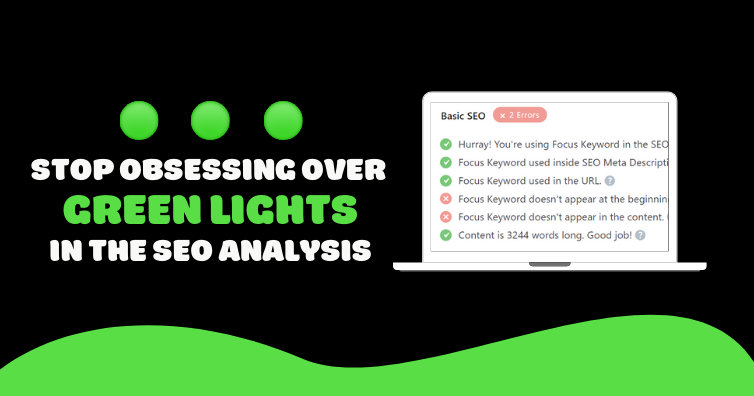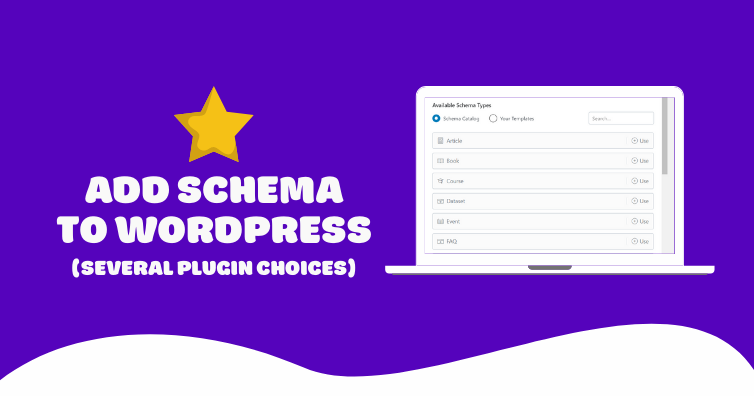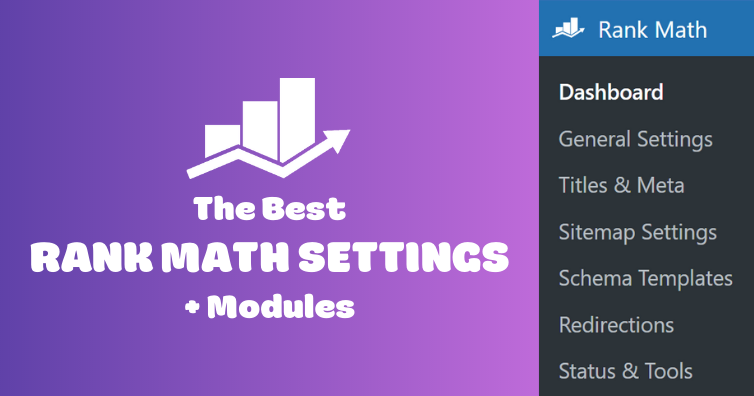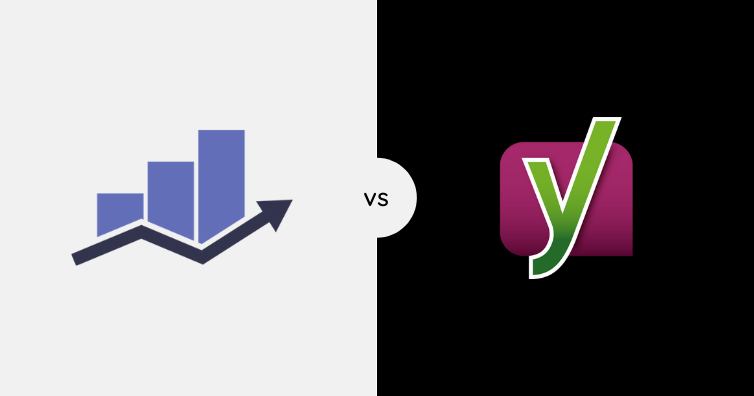
Content optimization does NOT mean getting green lights in Yoast – and I think it’s time someone drops the bomb on Yoast’s SEO analysis when it tells you to use your focus keyword.
The problem is, Yoast’s SEO analysis only detects exact matches of your focus keyword in the visual and HTML editor (not page builders). It does not detect plurals, synonyms, or partial matches of your keyword. So when you’re writing a nice page title and snippet (SEO title + meta description) people will actually click in search results, don’t just use your exact focus keyword to get green lights in Yoast’s SEO analysis. Consider click-through rates (CTR) as well.
The solution is, to find a balance between using your focus keyword AND make your content + snippets read nicely. If my focus keyword is “Yoast Focus Keywords” my SEO title could be: How To Choose Focus Keywords In Yoast (You Can Actually Rank For). It’s not an exact match, and I don’t use the keyword in the beginning of the SEO title like Yoast wants, so 2 bullets will be red in Yoast’s SEO analysis. But it’s a nice headline and I rank #5 for this keyword (Yoast has the top 4 results). So it’s perfectly OK to not include exact matches and get red lights in Yoast.
- What The SEO Analysis SHOULD Say
- Optimized Post (Example)
- Writing Headlines For Pages vs. Posts
- Keyword Density Barely Matters
- When To Shorten URLs (And Remove Stop Words)
- Image Alt Text Should Just Describe The Image
- Yoast Doesn’t Analyze Content In Page Builders
- When To Use Exact Keyword Matches (Examples)
- Use Yoast’s Bulk Editor To Rewrite Your Snippets
- Don’t Target The Same Keyword On Multiple Pages
- Most People Don’t Choose The Right Focus Keywords
1. What The SEO Analysis SHOULD Say
WARNING: injecting your focus keyword in the content body/snippets can make them look spammy! Have you thought about writing a nice SEO title to increase your CTR instead? Every result in Google will be using the keyword – why would anyone click your link? Yes, you should use your keyword in the page title, SEO title, and meta description… but you don’t have to use an exact match just to make your lights turn green. Just sprinkle it’s individual words throughout the text! Keywords and nice headline… find the balance. Forget about keyword density and using your keyword in the H2… we all know these barely matter in on-page SEO. Mention it in the first couple sentences and get back to creating awesome content (that is better than whoever’s in the top results for your keyword). Ps. if you’re using a page builder, Yoast won’t detect anything in your content, since it only analyzes content in the visual/HTML editor. Do not force yourself to get green lights.
Now go to Yoast’s bulk editor (SEO > Tools > Bulk Editor) and rewrite your SEO titles + meta descriptions so people actually want to click them!

2. Optimized Post (Example)
Here’s a post where I rank #1 for these keywords: yoast settings, yoast settings 2018, yoast wordpress seo settings, best yoast settings, among other keywords about configuring Yoast.

How I selected my focus keyword…


3. Writing Headlines For Pages vs. Posts
Post titles are usually much longer than page titles… this is the only major difference in how I optimize pages vs. posts. My page on WordPress SEO Consulting has a simple page title of “WordPress SEO Consulting.” But my post title for this tutorial you’re reading is… way longer.


4. Keyword Density Barely Matters
Google is giving less and less importance on keyword density and more weight on quality content. Yes, you should still mention your focus keyword (or a partial match of it) a few times in the content, and most importantly, once in the first couple sentences. But to go through all your pages/posts and inject your focus keyword… it’s not a good investment of time. You’re better off improving content. My keyword density % in Yoast is usually red, anywhere from 0-1% especially since I don’t always use exact matches, which is the only thing Yoast will detect.
![]()
5. When To Shorten URLs (And Remove Stop Words)
Yoast’s SEO analysis prompts you to remove stop words (common words most search engines skip over) like the, a, and, in, etc. Sometimes you SHOULD shorten URLs to only include your focus keyword. WordPress automatically uses the page/post title for your URL, so the URL for this post you’re reading now would have been VERY LONG. So to emphasize my keywords, I shortened it to be https://onlinemediamasters.com/green-lights-seo-analysis/

But sometimes it’s not a good idea to remove stop words since this makes URLs confusing on what the topic is actually about. Here are examples when you shouldn’t remove stop words:

See how they don’t even make sense? Yes, you should shorten URLs and include your focus keyword. But if stop words make it read funny like in the examples above, don’t remove them.
6. Image Alt Text Should Just Describe The Image
If you have an image that describes your focus keyword, by all means use it as the alt text. But there is absolutely no reason to go hunting for images and change their alt text just to get another green light in Yoast. As long as you’re uploading images with a file name that actually describes the image, and use the file name as the alt text, you will be FINE (and you will probably have some nice partial matches of your keyword)! This tutorial has images for Yoast’s SEO analysis, focus keywords, bulk editor… so I will name them just like that. Keep it simple.
![]()
7. Yoast Doesn’t Analyze Content In Page Builders
If you’re using a page builder, Yoast’s SEO analysis won’t detect anything here, so you will need to do the on-page SEO manually. Just do it how you would on any content, you just won’t be able to tell when your lights turn green in Yoast. The SEO analysis doesn’t analyze content outside the WordPress Visual/HTML Editor, so this also applies to widgetized homepages.
8. When To Use Exact Keyword Matches (Examples)
The only time you should use your exact focus keyword is if it sounds natural (no injecting spammy keywords, no injecting them into SEO titles + meta descriptions at the cost of lower CTRs). But if you can still write a nice headline with your exact keyword, go ahead and do it.
SEO Titles Where I Use An Exact Match:
- YouTube Video SEO (Definitive Guide To Ranking Videos In 2018)
- How To Add Rich Snippets To WordPress In 2018 (2 Plugin Choices)
- The Ideal WP Rocket Settings (2018) With Cloudflare + MaxCDN
- WordPress Local SEO (Rank Higher In Google Maps / Local Results)
- WordPress Speed Optimization Services For Faster Websites
9. Use Yoast’s Bulk Editor To Rewrite Your Snippets
If you want to rewrite your SEO titles + meta descriptions to sound nice (and I would definitely recommend doing this), Yoast’s bulk editor lets you do it without going through individual pages/posts (it’s under SEO > Tools > Bulk Editor). The bulk editor doesn’t tell you each page’s focus keyword, and it does not measure the length of SEO titles + meta descriptions. SEO titles should be 50-60 characters, meta descriptions should be 150-160 (however in 2018, Google extended meta description length in many results and Moz now recommends 300 characters).

10. Don’t Target The Same Keyword On Multiple Pages
It’s counterproductive. You’re better off spending time improving content on 1 single page than creating a bunch of pages with mediocre content targeting the same focus keyword.

11. Most People Don’t Choose The Right Focus Keywords
The biggest problem I see with people using Yoast is choosing broad, competitive keywords they will never rank for. If you’re not ranking on the TOP of page 1 for many of your keywords, start choosing more specific (long-tail) phrases in Google Autocomplete. And if you’re still not ranking, get even more specific. Usually only websites with high domain authority (you can check this in OSE) can rank for broad, competitive keywords. Until then, always go long-tail.

Always Google your keyword and analyze the search results. Avoid competing with strong content (that covers the topic extensively) and authority websites like credit.com, amazon.com, etc. If you can create better content than the top results, you have a chance.

Use MozBar to Google your keyword and see each result’s PA (page authority) and DA (domain authority). Try to only compete with websites in your domain authority range.

Moz Keyword Explorer is also a great place to find keywords (it’s much better than Google Keyword Planner). Once you’ve narrowed down a list of long-tail keywords and analyzed search results to avoid strong content and authority websites, you’ll have a nice keyword list.
Conclusion: Yoast’s SEO Analysis Isn’t Perfect (Because…)
- Yoast doesn’t take into account good headlines/CTRs
- They only detect exact keyword matches, no partial matches
- They prompt you to increase keyword density which barley matters
- They prompt your to remove stop words, which can make URLs read funny
- They prompt your to use your exact keyword in H2’s (causes spammy subheadings)
- They prompt you to use your exact keyword in image alt text (even if it doesn’t describe the image)
These are all situational on the page/post, whether you actually have an image that describes your focus keyword, and whether you can write headlines/snippets that include your keyword AND still sound nice. Yoast is still a great SEO plugin, but I think they need to incorporate my warning to prevent people from injecting their focus keyword at the cost of spammy content.
Do you agree?
Cheers,
Tom





Tom, thank you for writing this piece. Deeply appreciate it. Like others in the comments section, I was also driving myself crazy trying to get all the green lights and get rid of as many red lights as possible.
But something in my gut tells me what I was doing felt unnatural to the flow of my writing (Now I got to edit the edit ha!). Something just didn’t feel right…just because SEO Yoast is one of the most popular WP plugins…it doesn’t mean they do everything right. Thanks again!
Yoast traffic lights have driven me nuts all week. I get green green and then I simply just open the post and they’ll turn to red and orange, red and red, orange and orange, 1 green 1 orange, 1 red 1 green…it’s a disaster I’m literally not even changing any text and it just seems to have a mind of it’s own.
I may just use a different plugin all together as it just annoys me, but there’s certainly no reason to worry about all greens at this point bc yoast can’t even figure out what it’s doing.
Yup, better off following the on-page SEO tips (eg. by Brian Dean) and not even using the SEO analysis.
Great article. I’ve been saying this since 2012. I actually was a featured speaker at WordCamp NYC in 2012 and when I said exactly as you just did, I was not only blasted by those who thought they knew better, but the video of my presentation was not posted on Wordpress TV. I have spoken at numerous WordCamps against the green light on Yoast and because of it, they have never added my presentations. When I asked someone in the know at WordPress, they said it was because Yoast is a major backer and they did not want bad press. I’ll say it again. It is a way of getting amateurs to use their plugin over others by believing it will improve their rankings. Good luck with that.
Wow I can’t believe they didn’t publish it because of that – frustrating when politics get in the way of truth.
I still can’t believe some of the things Yoast claims, like that their premium plugin helps “keep your site updated with Google’s algorithm.” And that “keyword density” is still something you should be highly concerned with.
I was happy to see their plugin finally detected variations of your keyword, but still, they need to get away from keyword density. It’s 2019 and SEO plugins should not strictly rely on keyword usage to tell you your on-page SEO is good. Rank Math by MyThemeShop seems to have it down, at least the features part.
I’d also note that the Flesch Reading Test is not relevant if you are writing B2B content. Dumbing down your writing to a 13 year old reading level is insulting to professional visitors making large buying decisions. More important to mix up sentence lengths for readability than to have a page full of chopped down sentence fragments.
Most important takeaway here for me is that Google ‘likes’ good, relevant writing, not ‘gaming the system’ writing.
That pretty much sums it up Martin. We’re not all writing for children.
Hi Tom
YOAST says I should move focus keyword to “beginning “ of SEO title box; is this important or should I leave SEO title as it is in Blog title (with keyword)?
Will cutting a few initial words on SEO title to get keywords up front mess up the The search ranking?
I usually leave blog post title as same as YOAST SEO title
Howard
If your SEO title reads nicely, you don’t have to include it inthe beginning. No need to sacrafice CTRs.